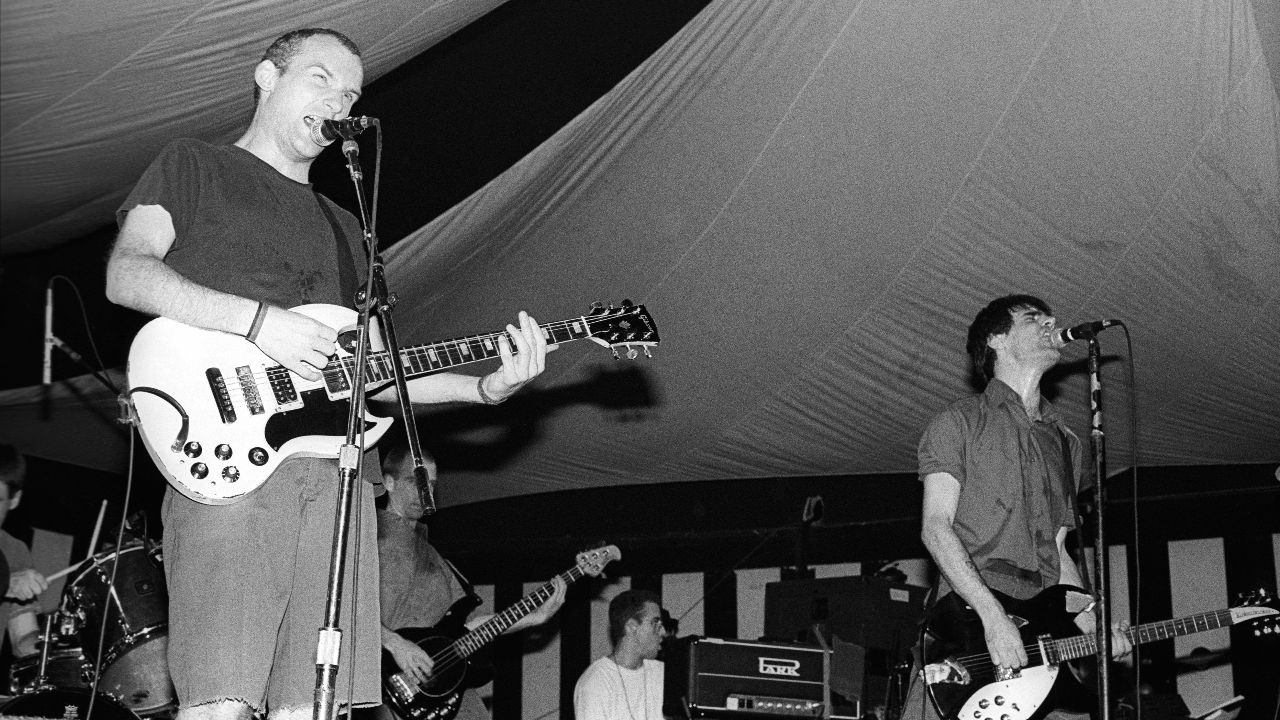Fugazi are a band from Washington, DC – we use the current tense here, as the indefinite hiatus they announced after three London shows in November 2002 is still in operation, and time has not yet officially been called on their trailblazing, hugely influential career.
Fomed in 1987, the band, named after dark US army slang for a fucked up situation, are determined and uncompromising in their DIY approach; they release their music through Dischord, a label set up by frontman Ian MacKaye and former bandmate Jeff Nelson to release their own Teen Idles record in 1980. Famously, the quartet charged only $5 admission to shows - this later skyrocketed to $6 - and steadfastly refuse to sell any merchandise, true to their often-quoted lyric "You are not what you own."
In what could be seen as a quiet, no, fervent, prayer for one last tour, we’ve ranked their studio albums – as well as a documentary soundtrack and the long-player compilation of their first two EPs – from worst to best.

8. Instrument Soundtrack (1999)
You can trust Louder Our experienced team has worked for some of the biggest brands in music. From testing headphones to reviewing albums, our experts aim to create reviews you can trust. Find out more about how we review.
“The following is for reference only,” says a voice at the beginning of a demo of Pink Frosty, the opening song on the soundtrack of Jem Cohen's brilliant lo-fi Fugazi documentary, featuring footage from their early days until 1998.
Featuring studio outtakes and several demos from 1998’s End Hits, the highlight is I’m So Tired, a piano ballad gently sung by MacKaye, occasionally covered in concert by Eddie Vedder. It was later sampled on Sleep Rules Everything Around Me, from Wugazi’s 13 Chamber, a genius mash-up of Wu-Tang Clan and Fugazi released for free in 2011. Fascinating for hardcore fans, Instrument Soundtrack is something of a curio and is recommended for completists only.
7. End Hits (1998)
After a three-year gap in releases, some fans took the title of Fugazi's 1998 album at face value and people began to wonder if End Hits would be their last. “People thought of it like this tombstone thing, but I think it has a lot to do with the fact that there isn't a constant media presence for Fugazi,” co-vocalist and guitarist Guy Picciotto told the fanzine Morphizm. “It’s not like we're on MTV all the time or doing interviews with Rolling Stone.”
Save for taut, agitated songs like Break, Place Position and Five Corporations, End Hits took as many experimental turns as Red Medicine, offering up a varied palette. Pink Frosty is more of an avant garde noise mood board, sitting alongside the dubby Closed Captioned and the woozy Floating Boy. The shimmering, loose guitars of Recap Modotti – named after the Italian-American model, photographer and political activist Tina Modotti – threaten to move into a higher gear, but tantalisingly holds back as Picciotto and bassist Joe Lally offer an understated vocal performance. Overall, End Hits is a rewarding listen for those prepared to dig a little further. And that title? It was a band in-joke about Brendan Canty’s drumming at the conclusion of closer F/D. The wags.
6. Steady Diet Of Nothing (1991)
In the absence of regular producer Ted Niceley, Steady Diet Of Nothing was produced by the band. Ian MacKaye, after all was no stranger to the desk: that same month, he produced Nation of Ulysses’ superb debut 13-Point Program to Destroy America. But with “no referee” in the studio – MacKaye’s words – the four found the experience tougher than previous visits to the Inner Ear studio. “It was like we were walking on eggshells, trying not to offend each other,” MacKaye would tell Guitar World years later. “No one would say, ‘Turn your guitar down' or ‘turn the drums down’. So we ended up getting a democratic mix, and a lot of times democratic mixes equal bad mixes.”
Nevertheless, there are many moments of brilliance on this 36-minute album: the woozy dub and nagging riffs of Reclamation, the atmospheric bass-led Long Division, and the call to arms of the agitated KYEO, which states, ‘Silence is a dangerous sound, we must keep our eyes open’.
With Nirvana’s Nevermind changing the face of alternative rock forever in the months following Fugazi’s second studio album, Steady Diet... was somewhat overlooked. In Michael Azerrad’s Our Band Could Be Your Life, Guy Picciotto talks about the quartet touring the album in Australia after Nevermind had broke worldwide, and says ‘We might as well have been playing ukeles for all the impact we were having.’
“I think that was a perspective we felt to some degree," Ian MacKaye later told Paul Brannigan. It was just weird sometimes... At times we got drowned out by the machine, but that doesn’t mean we weren’t talking and we weren’t communicating.”
5. 13 Songs (1989)
A compilation of Fugazi’s first two EPs, 13 Songs features 1988’s self-titled debut and Margin Walker, which followed eight months later. The elements which inform the quartet’s sound are already honed on the first EP's calling card, Waiting Room: Canty’s stellar drumming and Lally’s warm, thoughtful bass lines allow the simple guitar riffs to roll and weave through MacKaye and Picciotto’s vocal interplay.
Other highlights across the two EPs include the strident Margin Walker, the furious Suggestion, the tense, empathetic Glue Man and the cathartic slow-burn of Promises.
4. Red Medicine (1995)
The Washington DC quartet’s fourth full-length emerged while the alt-rock scene was clogged by bands attempting to fill the void left by Kurt Cobain's death by suicide the previous year. Target, a pacy, angular anthem placed towards the end of the record, is a withering attack on the cynicism of such signings, Guy Picciotto singing : “I realise that I hate the sound of guitars, a thousand grudging young millionaires.”
Red Medicine has a number of equally white-hot moments: Do You Like Me? and Bed For The Scraping offer similar thrills, while Back To Base and Downed City rattle and clatter like the rawest moments on 13 Songs.
There’s a degree of experimentation at play, too, with the funk instrumental Combination Lock and the free jazz squall of Version, featuring Picciotto playing that most punk of instruments, the clarinet). It may take a few listens to bed in, but Red Medicine remains one of Fugazi's most satisfying listens.
3. Repeater (1990)
Fugazi’s debut album proper is even more assured than their previous EPs. Recorded during a series of morning shifts to allow producer Ted Niceley to study at cooking school, there’s a sense of focus and urgency throughout its 11 songs.
Powerful in both music and message, it explores gun violence in America (Repeater), a drug overdose (the quiet-loud masterclass of Shut The Door), greed (the sub-two minute Greed), and consumerism (the confrontational Merchandise, during which the quartet spell out their independent ethos: ‘We owe you nothing, you have no control’). Genre-defining.
2. In On The Kill Taker (1993)
Fugazi's third full-length had a shaky star, with the band scrapping initial recordings with Steve Albini in Chicago, and returning to work with Niceley and Inner Ear owner and recording engineer Don Zientara. The results are taut and free of filler.
Facet Squared is a fierce swipe at patriotism (‘We draw lines and stand behind them, that’s why flags are such ugly things’), while Returning The Screw revisits the powerful dynamics of Repeater’s Shut The Door. The agit-funk of Cassavetes celebrates the independent filmmaker John Cassavetes who flew in the face of Hollywood’s received wisdom (‘Complete control for Cassavetes, if it's not for sale you can't buy it') while Public Witness Program and MacKaye's scathing Great Cop are white-hot punk blasts.
If the impact of Steady Diet Of Nothing was diluted by Nirvana’s major label debut, the resultant mainstream popularity of alt-rock had a trickle down effect on IOTKT: it entered the Billboard album chart, as Rolling Stone described its creators as “the only band that matters”.
It upset the eco-system of a Fugazi show, too, as the popularity of crowdsurfing – which became something of a feature in MTV rock videos and Wayne’s World 2 – necessitated security and barriers to become a fixture at larger capacity shows.
“Dealing with everyone else’s success was a headache for us, a real nightmare: it fucked with our thing and just gave us more work to do,” MacKaye told Paul Brannigan in 2001.
Months later, the band were pursued by major labels, including Atlantic Records, who offered a ridiculous amount of money and promises of creative control to join the label. They declined.
1. The Argument (2001)
Recorded at Inner Ear by Don Zientara and the band in early 2001, The Argument could be the perfect Fugazi album. Everything that made the Washington DC four-piece great – urgent zig-zagging riffs, a compelling dub-led rhythm section, unmistakable vocal interplay and a willingness to weave disparate genres into their own template – all reach new heights on their sixth full-length.
The quartet's eagerness to explore new avenues saw them bring in roadie and musician Jerry Busher on percussive duties, and Unrest’s Bridget Cross and Bikini Kill’s Kathi Wilcox for backing vocal duties.
Following the found sounds of Intro, Cashout sees MacKaye call out unscrupulous landlords hellbent on gentrifying poorer areas over a brooding riff and Amy Domingues’ cello parts: “Furniture's out on the sidewalk next to the family, that little piggy went to market, so they're kicking out everyone”.
The Kill, written in the studio, is, for all its sparse guitar work and thoughtful bass lines, one of the album’s more tense moments, while Full Disclosure surges and writhes like a Beach Boys panic attack. The thrust of Oh, channels The Beatles circa The White Album, while the charging Epic Problem remains a career highlight.
The band’s sixth studio album would their last, for the time being, at least. On Vish Khanna’s excellent Kreative Kontrol podcast, Joe Lally mentioned that the four musicians still get together and play music just for the fun of it. But the chances of this spilling out into a full-blown reunion are as likely as Ian MacKaye ordering a pint and smoking a cigarette.
"Our relationships tower above people’s need to have a tidy package, to have a neat conclusion to the Fugazi story," MacKaye told Paul Brannigan in 2011. "It’s been a certain amount of years since we’ve done anything? Okay, tough shit, I don’t give a fuck, I just don’t care. Our band has always confused people.”

